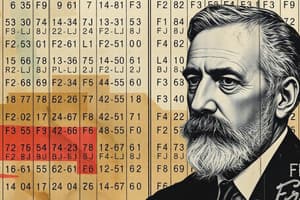Podcast
Questions and Answers
What is the most important portion of the unconscious in Jung's Analytic Psychology?
What is the most important portion of the unconscious in Jung's Analytic Psychology?
- Logical reasoning
- The conscious mind
- The distant past of human existence (correct)
- Personal experiences of the individual
In Jungian Types, what characterizes Extraverted Thinking?
In Jungian Types, what characterizes Extraverted Thinking?
- Valuing every conscious activity
- Following fixed rules (correct)
- Being subjective in thinking
- Repressing feelings
According to Jung, what is the role of the ego in relation to the unconscious self in a psychologically healthy person?
According to Jung, what is the role of the ego in relation to the unconscious self in a psychologically healthy person?
- The ego takes a secondary position to the unconscious self (correct)
- The ego has no relationship with the unconscious
- The ego controls the unconscious self
- The ego is the core of personality
Which function in Jung's theory involves recognizing meaning?
Which function in Jung's theory involves recognizing meaning?
How does Jung describe Intuition in his theory of personality?
How does Jung describe Intuition in his theory of personality?
Which personality type is likely to be theoretical, intellectual, and impractical?
Which personality type is likely to be theoretical, intellectual, and impractical?
What is a key characteristic of someone with Extraverted Feeling?
What is a key characteristic of someone with Extraverted Feeling?
Which profession would most likely involve seeking pleasure and enjoying new sensory experiences?
Which profession would most likely involve seeking pleasure and enjoying new sensory experiences?
What distinguishes Introverted Feeling individuals from others?
What distinguishes Introverted Feeling individuals from others?
Which personality type may have trouble getting along with other people?
Which personality type may have trouble getting along with other people?
What is a common characteristic of the Attitudes of Introversion?
What is a common characteristic of the Attitudes of Introversion?
Which concept involves the integration of the diverse system of the self and the emergence of a deeper self or essence?
Which concept involves the integration of the diverse system of the self and the emergence of a deeper self or essence?
In Jungian View, what is considered the ultimate goal of personality development?
In Jungian View, what is considered the ultimate goal of personality development?
During which stage of development does a person experience chaotic and sporadic consciousness along with 'Islands of consciousness'?
During which stage of development does a person experience chaotic and sporadic consciousness along with 'Islands of consciousness'?
Which stage of development is described as brilliant like the late morning sun, yet also clearly headed for the sunset according to the text?
Which stage of development is described as brilliant like the late morning sun, yet also clearly headed for the sunset according to the text?
What marks the beginning of the Dualistic Phase in childhood development?
What marks the beginning of the Dualistic Phase in childhood development?
Which stage is characterized by increased anxieties, tremendous potentials, and the tendency to become more religious according to the provided text?
Which stage is characterized by increased anxieties, tremendous potentials, and the tendency to become more religious according to the provided text?
What characterizes individuals with Introverted Sensing?
What characterizes individuals with Introverted Sensing?
Which group of people are associated with Extraversion Intuition?
Which group of people are associated with Extraversion Intuition?
What is the main characteristic of Collective Unconscious according to the text?
What is the main characteristic of Collective Unconscious according to the text?
What distinguishes individuals with Introverted Intuition?
What distinguishes individuals with Introverted Intuition?
What is a common characteristic of Personal Unconscious according to the text?
What is a common characteristic of Personal Unconscious according to the text?
What is the main goal of psychotherapy according to the text?
What is the main goal of psychotherapy according to the text?
Which method is used to uncover feeling-toned complexes according to Jung?
Which method is used to uncover feeling-toned complexes according to Jung?
How does Jung's view on dreams differ from Freud's view?
How does Jung's view on dreams differ from Freud's view?
What is the purpose of the active imagination method?
What is the purpose of the active imagination method?
According to Jung, what do dreams help individuals do?
According to Jung, what do dreams help individuals do?
Which of the following is NOT one of the 4 basic approaches to therapy mentioned in the text?
Which of the following is NOT one of the 4 basic approaches to therapy mentioned in the text?
Flashcards are hidden until you start studying
Study Notes
Personality Types and Attitudes
- Introverted Thinking: Need for privacy, theoretical, and impractical, may have trouble with others, higher cognition and abstract.
- Extraverted Feeling: Sociable, seek harmony with the world, respect tradition and authority, giving own value, emotional.
- Introverted Feeling: Quiet, thoughtful, and hypersensitive, mysterious and indifferent to others, value based on historical facts.
- Extraverted Sensing: Seek pleasure and new sensory experiences, strongly oriented toward reality, everyone agrees.
Jung's Analytic Psychology
- Collective Unconscious: Most important part of the unconscious, inherited from human existence, not from personal experiences.
- Personal Unconscious: Contents of the unconscious, emotionally toned, conglomeration of associated ideas, personal and mixed experiences.
Levels of Psyche
- Conscious: Attitudes and functions, sensed by the ego, unconscious elements have no relationship with the ego.
- Unconscious: Includes collective and personal unconscious.
Psychological Types
- Attitude: Predisposition to act or react in a characteristic direction, introversion and extraversion, combines with four functions, forming eight possible orientations or types.
Functions
- Thinking: Recognize meaning, objective.
- Feeling: Value or worth of something, valuing every conscious activity.
- Sensing: Something exists, use of senses.
- Intuition: Know about something without knowing how, perception beyond consciousness.
Jungian Types
- Extraverted Thinking: Fixed rules, repress feelings, try to be objective, proof-based.
- Introverted Sensing: Passive, calm, artistic, objective sensory events, visual senses and interpretation.
- Extraverted Intuition: Creative, make decisions based on hunches, in touch with conscious wisdom, repress sensing, foresee something.
- Introverted Intuition: Mystic dreamers, unusual ideas, seldom understood by others.
Development Stages
- Childhood: Early morning sun, full of potential, but lacking in brilliance (consciousness).
- Youth: Morning sun, puberty until middle life, increased activity, maturing, sexuality, growing consciousness, recognition.
- Middle Life: 35 or 40 years old, increasing anxieties, period of tremendous potentials, becomes more religious, crucial stage.
- Old Age: Evening sun, its once bright consciousness now markedly dimmed, backward orientation.
Methods of Investigation
- Word Association Test: Uncover feeling-toned complexes.
- Dream Analysis: Uncover elements from the personal and collective unconscious, facilitate self-realization.
- Active Imagination: Begin with any impression, reveal archetypal images, clarify unconscious contents.
Psychotherapy
- 4 Basic Approaches to Therapy: Confession, Interpretation, Explanation, and Elucidation, Education of Patients, Transformation.
- Employment: With patients in the second half of life, concerned with individuation, wholeness, or self-realization.
Studying That Suits You
Use AI to generate personalized quizzes and flashcards to suit your learning preferences.




